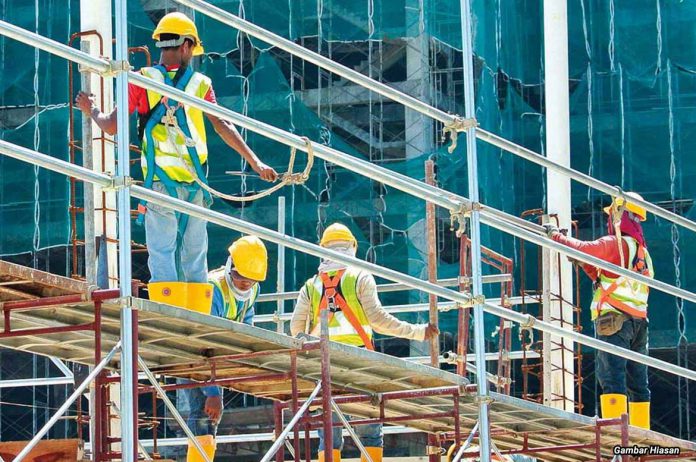KUALA LUMPUR, Dec 5 — The extended COVID-19 outbreak in the country has continued to affect the construction industry this year, but the impact has been more moderate compared to last year due to a vaccination rollout targeted at construction workers, among others.
The Construction Industry Development Board’s (CIDB) chief executive Datuk Ahmad Asri Abdul Hamid said a proactive approach had been taken by the Ministry of Works (MoW) through CIDB to increase vaccination rates among construction workers.
“The Construction Industry Vaccination Programme (CIVac), which is a specific vaccination programme for construction workers, was launched on July 1, 2021 and implemented in five states. The CIVac programme ended on Sept 28, 2021 with 100,180 workers fully vaccinated,” he told Bernama.
He said the government has ensured that construction projects followed strict compliance with standard operating procedures (SOPs) and the vaccination of workers.
Also, a total of 3,868 government projects valued at RM30.1 billion have been awarded as of October 2021, compared to 3,653 projects valued at RM25.9 billion awarded in the same period last year as the government moves to support the sector.
“It is expected that the number and value of government-awarded projects in 2021 will continue to increase. Hopefully, this trend will also be followed by the private sector, whereby more private projects will be implemented,” he said. “MoW, in collaboration with CIDB, has taken initiatives to expedite the vaccination of construction workers. The increasing vaccination rate would further facilitate the reopening of more economic sectors and allow the overall construction supply chain to operate,” he said.
Recovery after RM42 billion hit
According to Ahmad Asri, the construction industry is estimated to have incurred a loss of RM42 billion following the implementation of the movement control order (MCO) from March 2020 until now.
“A total of RM18 billion was the estimated loss during the MCO 3.0 period which started in June 2021 until September 2021. The remaining RM24 billion was the loss from the implementation of MCO1.0 in 2020 which affected construction work from March to July 2020. About 10,000 projects were affected by the pandemic,” he said.
The Malaysian construction industry is forecast to record real growth of 9.2 per cent in 2021, following a contraction of 19.4 per cent in 2020. This compares to the previous forecast of 11.2 per cent growth for this year.
The downward revision is primarily due to the implementation of the nationwide lockdown in June 2021, which affected construction activity.
The construction industry’s output is expected to be supported by the gradual economic recovery, a focus on completing large infrastructure projects, and an increase in investment in industrial and energy projects.
The industry is expected to post a sharp recovery in 2021, assuming that there is no repeat of the containment measures that were in place in 2020, with growth supported by investments in transportation and energy projects.
The sector is expected to register an annual average growth rate of 6.8 per cent between 2022 and 2025.
In September 2021, the government announced a plan to establish the Public-Private Partnership (PPP) 3.0 model as a specialised mechanism to fund infrastructure projects to stimulate economic growth in the 12th Malaysia plan (12MP) between 2021-2025.
In June 2021, the government unveiled its energy transition plans until 2040, aiming to increase the proportion of renewable energy in the total energy mix from 2.0 per cent in 2019 to 31 per cent by 2025, and 40 per cent by 2035.
Over the forecast period, the industry’s growth will also be supported by a recovery in economic conditions, coupled with investments in residential, industrial and water infrastructure projects.
As part of the 12MP, the government announced its goal of developing 120 cities to achieve sustainable city status by 2025, by providing additional support to private sector projects that implement strategic development programmes.
The government also intends to construct 500,000 affordable houses by 2025, as part of the 12MP.
In September 2021, the federal government approved Kelantan’s RM25.8 billion water infrastructure project.
Moving forward, Ahmad Asri said the Malaysian construction industry is expected to regain its positive growth following the continuation and acceleration of major infrastructure projects as announced in the 12MP.
“Infrastructure projects such as the East Coast Rail Line (ECRL), East Coast Expressway 3 (LPT3), Mass Rail Transit Line 2 (MRT2), Klang Valley Double Tracking 2 (KVDT2), Johor-Singapore Rapid Transit System (RTS), Pan Borneo Highway in Sabah and Sarawak and the Baleh hydroelectric project are also projected to spur growth.
“Budget 2022 allocates RM75.6 billion for development expenditure, which is 9.6 per cent higher than in Budget 2021. Of this, about RM25.3 billion has been allocated for construction works,” he noted.
















